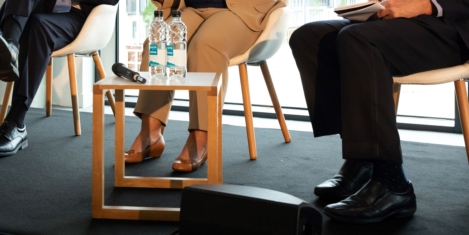To provide the best experiences, we use technologies like cookies to store and/or access device information. Consenting to these technologies will allow us to process data such as browsing behaviour or unique IDs on this site. Not consenting or withdrawing consent, may adversely affect certain features and functions.
The technical storage or access is strictly necessary for the legitimate purpose of enabling the use of a specific service explicitly requested by the subscriber or user, or for the sole purpose of carrying out the transmission of a communication over an electronic communications network.
The technical storage or access is necessary for the legitimate purpose of storing preferences that are not requested by the subscriber or user.
The technical storage or access that is used exclusively for statistical purposes.
The technical storage or access that is used exclusively for anonymous statistical purposes. Without a subpoena, voluntary compliance on the part of your Internet Service Provider, or additional records from a third party, information stored or retrieved for this purpose alone cannot usually be used to identify you.
The technical storage or access is required to create user profiles to send advertising, or to track the user on a website or across several websites for similar marketing purposes.
 Any survey that sets out to establish what people believe cuts their productivity and annoys them most about their workplace almost invariably throws up the same result; the noise and distractions generated by other people. So it will come as no surprise to learn that the same surveys usually find that employees believe that peace and quiet and freedom from distractions is the most important factor when it comes to getting some decent work done. (more…)
Any survey that sets out to establish what people believe cuts their productivity and annoys them most about their workplace almost invariably throws up the same result; the noise and distractions generated by other people. So it will come as no surprise to learn that the same surveys usually find that employees believe that peace and quiet and freedom from distractions is the most important factor when it comes to getting some decent work done. (more…)








 UK SMEs are losing out to big tech in the battle to recruit top tech talent, according to Robert Half UK’s new report,
UK SMEs are losing out to big tech in the battle to recruit top tech talent, according to Robert Half UK’s new report, 


 AI and its transformational effect on the global business landscape was the dominant theme on day one of the
AI and its transformational effect on the global business landscape was the dominant theme on day one of the 










 An emerging super-group of employees and consumers in the UK is adding intense pressure to already challenged C-suite leaders who are navigating tough economic, technological and geo-political environments – further threatening company growth, a new Accenture (NYSE: ACN) study finds. With nearly three-quarters (73 percent) of these powerful stakeholders believing they have the potential to destroy company value in the long term, the C-suite understands the need to respond.
An emerging super-group of employees and consumers in the UK is adding intense pressure to already challenged C-suite leaders who are navigating tough economic, technological and geo-political environments – further threatening company growth, a new Accenture (NYSE: ACN) study finds. With nearly three-quarters (73 percent) of these powerful stakeholders believing they have the potential to destroy company value in the long term, the C-suite understands the need to respond. 
 A new study suggests that more than 7 in 10 Britons working in production are concerned that their jobs may be made obsolete thanks to developments in Artificial Intelligence in the coming years. What’s more, over two fifths of respondents believe AI could rebel against humans. As technology develops and more money and time is invested into AI, the public’s opinion has been explored, with those working in production, HR and construction uncovered to be the most worried that AI could take their jobs away from them.
A new study suggests that more than 7 in 10 Britons working in production are concerned that their jobs may be made obsolete thanks to developments in Artificial Intelligence in the coming years. What’s more, over two fifths of respondents believe AI could rebel against humans. As technology develops and more money and time is invested into AI, the public’s opinion has been explored, with those working in production, HR and construction uncovered to be the most worried that AI could take their jobs away from them. 








June 19, 2019
Coworking is now the key driver of change in property market
by Daniel Wright • Comment, Property, Workplace design